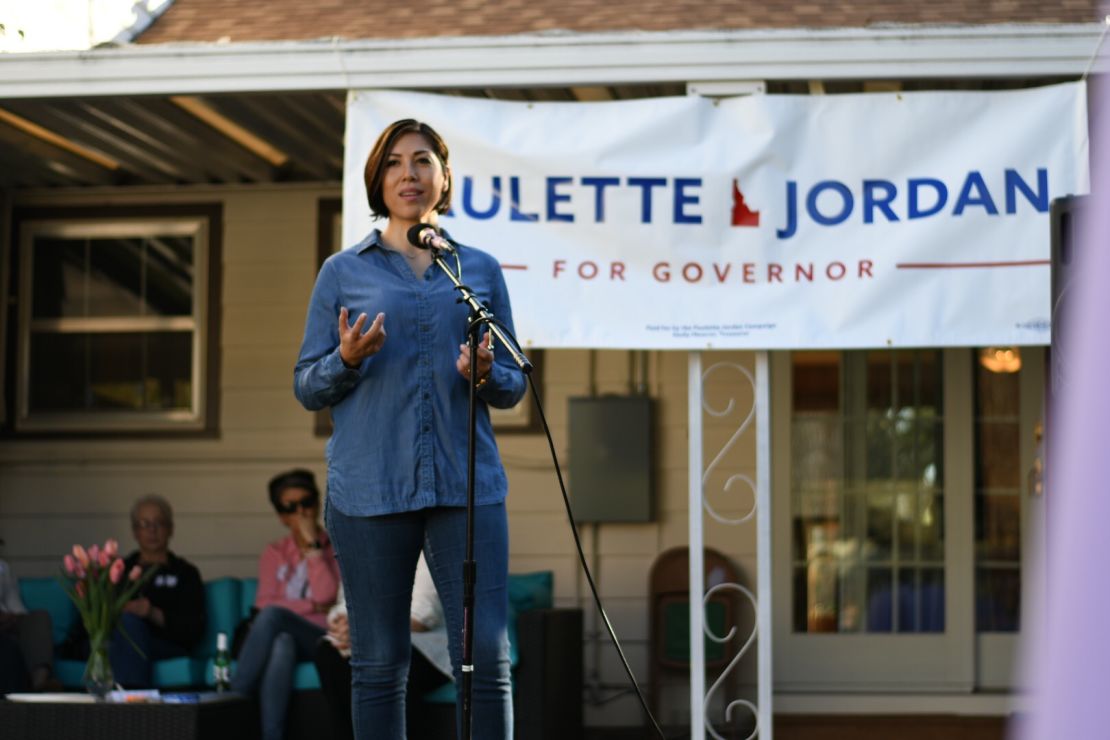“No chance in hell.”
“Wait your turn.”
“Why bother?”
Paulette Jordan has heard it all, especially in the waning hours before Tuesday’s Idaho primary, where she is hoping to advance her long-shot candidacy for governor of Idaho. But as she can often do, given her height of nearly six feet, the Democrat and two-term Idaho state legislator lifts her gaze above the immediate ruckus. She instead looks through the long lens of her family’s indigenous history that now drives her effort to become the first Native American governor in US history.
“I come from a powerful line of women. I’m proud of that heritage and legacy,” said Jordan, in response to a ‘why bother?’ question. “The opportunity for women is now. The President is divisive. Women know we can bring the country together. I’m working to defend my state, my people, even as this President is part of spreading hate and fear.”

Jordan makes the criticism against Trump fully aware of his 2016 victory in her state, which he won by 32 points. Idaho is more than 80% white and voted Republican so long that the Idaho Statesman referred to all the Democratic candidates for governor starting in 1998 as the “sacrificial lamb in the governor’s general election race.” Still, the newspaper’s editorial board gave her a lukewarm endorsement as “a chance to excite Idahoans looking for new leadership.”
As both a Native American and a young woman, the 38-year-old believes she’s the stark difference needed to crack that streak of losses racked up by those middle-aged, white male Democratic gubernatorial candidates. She’s the antidote needed in the Trump era, she believes. With her youth and history-making run, her candidacy captures the most unmitigated example of a new kind of woman driven to run for higher office after Hillary Clinton’s loss.
Indian Country Today counts a total of 23 Native American candidates running for statewide offices and Congress. Those candidacies can’t solely be credited to a whiplash response to the 2016 election. Jordan sees it more as a growing engagement of Native Americans after the bitter history of colonization and marginalization.
Jordan’s personal history speaks to that engagement. She’s a member of the Coeur d’Alene tribe and traces her history back generations to the chiefs she says fought settler expansion. She was raised on a farm in rural northern Idaho and went on to the University of Washington, where she first engaged in local politics and grassroots activism. She returned home after graduation and became the youngest person elected to the Coeur d’Alene Tribal Council.
“I’m connected to the land,” said Jordan, explaining her return to Idaho. “I come from that legacy of a love affair with the air and wildlife. That legacy is unique and a deep part of this state.”
Jordan, seeking to expand the Native voice in state government, ran in 2014 for the Idaho House of Representatives and beat an incumbent Republican. Jordan proudly points out she was the only North Idaho progressive to win re-election in 2016.
Since her candidacy began, Jordan has captured the imagination of national progressives and the media. Last January, she spoke at the Women’s March in Las Vegas, where entertainment icon Cher tweeted her all-caps admiration.
“She’s always invited to Idaho,” laughed Jordan, recalling the meeting and the tweet. Support from Planned Parenthood, Indivisible and PAC Democracy for America followed.
At the Idaho state level, support from her fellow legislators hasn’t been as forthcoming. Many of her fellow Idaho House Democrats are endorsing her primary opponent, A.J. Balukoff. He ran for governor in 2014 and lost by double digits to the now-outgoing Republican governor, despite spending millions of his own money in his campaign. At age 72, Balukoff is a Boise School Board member who moved to Idaho later in life. When asked about Jordan, Balukoff told the Idaho Politics Weekly, “I think people should stay with me this time around. She may be what we need the next time.”
Jordan doesn’t take kindly to that comment. “He thinks because of his privilege he can buy into privilege. I’ve rolled up my sleeves my entire life to earn my role. For someone to say, ‘Step aside,’ that’s something women have heard before,” said Jordan, her voice even but punctuated with seriousness. “This is our time.”
As if doubling down in response to the “step aside” comment, Jordan chose another woman, Kristin Collum, as her running mate. Collum’s campaign website describes a 12-year military career in the US Army, followed by engineering jobs in the tech sector. The two-woman ticket, in and of itself, is history-making in the state.
Asked what happens on Tuesday if she loses in the Democratic primary, Jordan replied, “We’ve already won. We’ve inspired and excited our community.” Then she added, “I’ll see you after Tuesday and we’ll talk about the general.”




